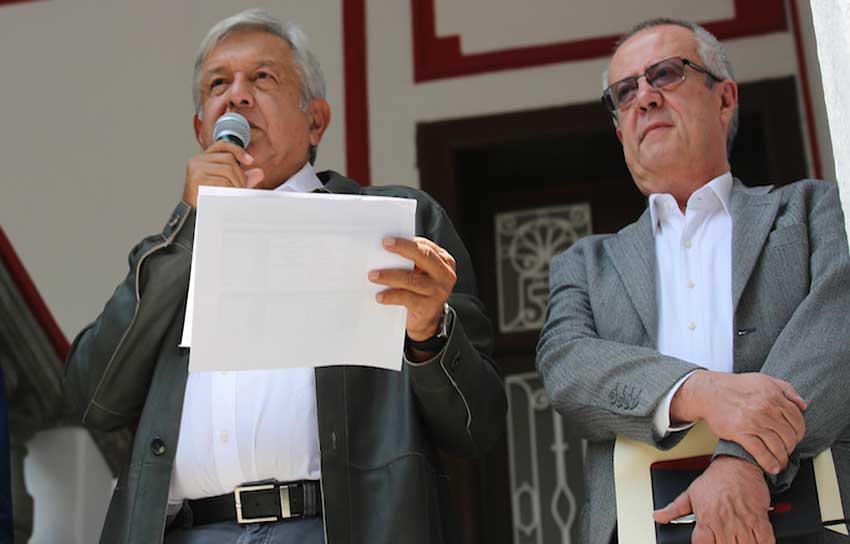President-elect Andrés Manuel López Obrador announced yesterday that the next government will prioritize seven urgent infrastructure projects with an investment of 500 billion pesos (US $26.5 billion).
The projects are the new Mexico City International Airport; a trade corridor in the Isthmus of Tehuantepec; the Cancún-Palenque train; the paving of 300 rural roads; the provision of internet to the whole country; earthquake reconstruction; and support for residents of marginalized neighborhoods.
López Obrador, or AMLO as he is widely known, told reporters outside his transition headquarters that the funds to carry out the projects will come from cost-saving measures his administration intends to adopt such as cutting the salaries of high-ranking officials and consolidating government purchases in the Secretariat of Finance as well as through the elimination of corruption.
With regard to the new airport, López Obrador repeated that there are three options: continue the project as a public-private joint venture, auction it off to the private sector or scrap it completely and use the existing airbase in Santa Lucía, México state, for commercial flights.
The president-elect, who was vehemently opposed to the airport project before softening his position, said his transition team will consult with specialists and the public between August 15 and October 15 as part of the incoming administration’s analysis of the three alternatives.
He said the current government has invested 80 billion pesos (US $4.2 billion) in the project, of which 45 billion pesos have been spent and 35 billion pesos remain in a trust.
In the Isthmus region — where the distance between the Gulf of Mexico and the Pacific Ocean is the shortest in the country — López Obrador said the aim is to “connect the countries of Asia with the east coast of the United States and create jobs in that entire strip of national territory.”
Future transportation secretary Javier Jiménez Espriú said earlier this month that the development planned for the Isthmus of Tehuantepec would include the modernization of the railroad between Coatzacoalcos, Veracruz, and Salina Cruz, Oaxaca, as well as the upgrading of the region’s highways.
The third infrastructure priority is the so-called Mayan Train which will run between Quintana Roo and Chiapas and cost 64.9 billion pesos (US $3.4 billion), according to the incoming government’s National Project 2018-2014 document.
Slated to be completed in four stages, the train line will have nine stops and is intended to boost tourism and the economy in the south of Mexico.
López Obrador said the fourth project would focus primarily on ensuring that all rural communities in Oaxaca and Guerrero are accessible via paved roads, adding that construction would require “the intensive use of labor” and consequently generate much-needed employment for local residents.
The president-elect also said his government will prioritize guaranteeing internet access to all Mexicans, pledging that the entire country will be connected.
López Obrador said he will present a national earthquake reconstruction plan on September 19, the first anniversary of the second of last September’s two major quakes.
The plan will prioritize “victims who are still living in camps, [exposed] to the elements and who have not been supported,” he said.
He pledged that monetary assistance will be fully funded by the federal budget and not provided in the form of loans.
Finally, the president-elect said that residents of Mexico’s poorest neighborhoods will also be afforded support with those living in marginalized areas of border cities, the country’s main tourism destinations and the metropolitan area of greater Mexico City set to be the initial priority.
López Obrador, who won the July 1 election in a landslide, will be sworn in on December 1 while the new federal Congress — in which the next president’s three-party coalition will have a majority in both houses — will sit for the first time on September 1.
Source: Sin Embargo (sp), Milenio (sp), El Economista (sp), El Universal (sp)
